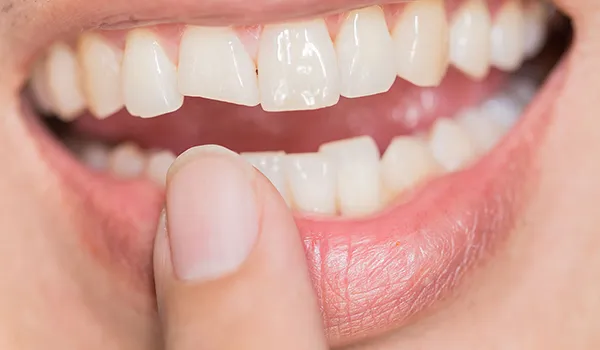Cracked teeth are one of the problems that affect the tooth enamel, leading to cracks in them, which makes the teeth more sensitive and susceptible to cavities. In this article, we will learn more about this problem and learn about its causes and methods of treating it.
What are cracked teeth?
Cracked teeth, also known as dental fissures, is a condition that causes cracks to appear on the surface of the teeth, as these cracks can be visible on the outside of the teeth or present in the internal tissues and cracked teeth may be painful or painless depending on the condition and its severity and cracking can be caused by sensitivity when eating cold or hot foods or when in contact with sweet or sour foods, as deep cracks may cause bacteria to collect inside the teeth and cause infections or tooth decay.
What are the causes of cracked teeth?
- Excessive pressure on teeth: Excessive pressure from frequent nail biting, using teeth to open objects, or even excessive pressure while eating food can cause cracked teeth.
- Sudden temperature changes: Extreme temperature fluctuations, such as eating hot and then cold foods quickly, can cause teeth to expand and contract quickly, leading to them cracking.
- Tooth decay: When tooth decay reaches the deeper layers of the tooth, it can cause cracks in the teeth.
- Exposure to high pressure during dental treatment: Some clinical procedures such as root fillings or crown placement can cause excessive pressure on the teeth, which may lead to them cracking.
- Genetic factors: There may be genetic factors that make teeth more susceptible to cracking.
- Improper fraction: Incorrect mouth closing, incorrect tooth friction, or incorrect pulling of the brush while brushing can cause cracked teeth.
- Symptoms of cracked teeth
- Allergy: When eating hot or spicy foods
- Pain: There may be pain of varying intensity that accompanies the crack, and this pain can worsen when eating or putting pressure on the teeth.
- Swelling or puffiness: In some cases, the gums surrounding a cracked tooth may become swollen as a result of inflammation.
- Change in color or shape: the appearance of white or dark spots on the surface of the teeth.
- Gum irritation: Signs of gum irritation, such as redness or bleeding, may appear in the cracked area.
- Formation of gaps: In cases of severe cracking, gaps or fractures may form in the teeth.
What are the methods of treating cracked teeth?
- Connecting teeth with cosmetic fillings
- Veneers
- Installing a dental crown
- Tooth root treatment
- Tooth extraction
- Do not treat the tooth, stay away from the factors causing the infection, and let the tooth heal automatically
How to treat cracked teeth
- Maintaining oral hygiene: Teeth should be cleaned regularly with brush, floss, and use mouthwash, as this helps remove food residue and plaque and reduces the risk of cracks forming.
- Stay away from harmful habits: Avoid using your teeth as a tool to open things, biting nails, or any other habits that may lead to cracked teeth.
- Reducing intake of acidic drinks and soft drinks: Excessive consumption of acidic drinks and soft drinks can lead to tooth erosion and increase the chance of cracks.
- Use of a mouth guard: In some cases, a mouth guard can be used that provides additional protection for the teeth from abrasion during sleep, especially if there is a deficiency in saliva production.
- Avoid excessive pressure: Avoid excessive pressure on the teeth, whether it is the result of excessive biting of objects or poor choices in clinical treatments.
- Maintain a healthy nutritional balance: Eating foods rich in calcium and other vitamins and minerals can help strengthen teeth and keep them strong.
- Visit the dentist regularly: You should visit the dentist for regular examination and cleaning, as the doctor can evaluate the health of the teeth and gums, identify any early signs of cracking, and take appropriate preventive measures.
Related articles :
Hollywood smile in Istanbul
advantages of cosmetic dentistry in Turkey
Plastic surgery in Istanbul
Dental treatment cost in Turkey
advantages of laser teeth whitening in Istanbul
Types and risks of dental implants in Turkey
hair transplant techniques in Istanbul
Dental veneers in Turkey
Hair transplantation in Turkey
Types of orthodontics in Istanbul and their features
